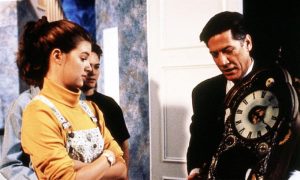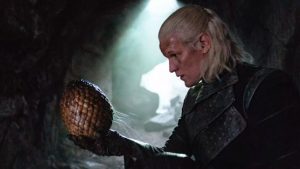
Showtime’s Yellowjackets (which just saw a season 1 release on Netflix) features a group of women whose lives we see from two different perspectives. The first point of view comes in the aftermath of a plane crash in the wilderness in 1996 while the ladies are in high school. The second one shows what the trauma survivors are up to 25 years later. As anyone would expect, these middle-aged women are really going through it. Not only do they still grapple with the guilt and consequences of the choices they made while trying to survive their own apocalypse a quarter-century before, but they also deal with contemporary problems that plague many other women their age.
There are four main adult characters that the audience gets to immerse themselves in when watching the 2021 timeline. Shauna Sadecki (Melanie Lynskey), Taissa Turner (Tawny Cypress), Misty Quigly (Christina Ricci), and Natalie Scatorccio (Juliette Lewis). Shauna and Taissa’s turmoil focuses mainly on domestic issues; Misty’s problems surround self-esteem. Natalie is the wild card and the true game-changer in Yellowjackets, though. When we meet the adult version of Nat, she’s in rehab for drug addiction and fighting to find a purpose that eludes her in civilian life.
With the flashback scenes to the 1996 timeline, audiences learn about how Nat grew confident and capable in the face of lethal danger. Much like someone like Daryl Dixon (Norman Reedus) on The Walking Dead, Nat derives her value from abnormal environments. When the world turned to shit, Natalie found herself. With excesses like substances and a dearth of friends to turn to, Nat loses all semblance of identity.
Lewis understands her character’s archetype from the jump. TV fans are familiar with the addicted, yet resourceful sidekick, right? Christopher Moltisanti (Michael Imperioli) on The Sopranos pioneered the template in the 2000s. Jesse Pinkman (Aaron Paul) on Breaking Bad cemented it in legend. Natalie falls under the same umbrella as these predecessors, and her story supplies the requisite contrast to her peers on Yellowjackets. There’s a palpable pain curdling under Nat’s psyche that Lewis depicts with haunting accuracy. The character’s past is her biggest boon and grandest demon.
Nat’s life is a whirlwind of dependence in the present. In the teen timeline, others look to her for resilience and guidance through the darkness. In the present, she’s lost in the face of light. She should be able to stand with pride in what she’s overcome and look to a future free of atrocities and inhumanity. Because she’s an outcast in the truest sense of the word, her ability to take in a new sense of self is blocked.
Jesse and Christopher are exactly like this in their respective shows. Jesse’s vocational skills and positive traits are always easily manipulated. For much of the series, his purpose lies in Walter White’s (Bryan Cranston) egotistical hands. In a detour during season 4, he switches allegiance to Gus Fring (Giancarlo Esposito). It’s two different sides of the same meth lab, though. Both men exploit Jesse’s follower nature and his overreliance on others to expunge his value, leaving nothing left for himself. Tony Soprano (James Gandolfini) does the same thing with Chris. When he has the chance to follow his girlfriend, Adrianna (Drea de Matteo) into hiding and away from a life of crime, Chris turns her in and has her whacked in hopes that the mob will supply his purpose.
We see with all three characters that they have so much more to give the world if they could just believe in themselves. Unnerving addiction (to both drugs and toxic people) spoils the morality and potential of Jesse, Chrissy, and Nat. They don’t deserve our sympathy, but all three actors portray the tragedy and the trauma with an authenticity that envelops us in their corner. We can also relate to them because they represent the potential downfall of us all if placed in mirror situations.
Lewis is no stranger to complexity. Her career careened onto movie screens in the 1990s when she appeared in some of the decade’s biggest hits. Cape Fear, What’s Eating Gilbert Grape, and Natural Born Killers all forced Lewis to battle with fear and self-respect. Natalie is yet another character in a long line of Lewis linchpins that propel her movies and shows into something unique and special. Allowing her the creative freedom of a series gives Lewis the time it takes to craft arguably her best performance yet.
SPOILER ALERT: The rest of this article contains spoilers for Yellowjackets season 2.
In a move that felt rushed and rash, perhaps in an attempt to give the series a shock death on par with something in Game of Thrones and keep fans on their toes during the offseason, Natalie’s journey ends in the second season finale. She sacrifices herself and dies from a poison meant for someone else, but all her obituary will state is that her cause of death was drugs. She never gets to see her story as fleshed out as Jesse’s and Chrissy’s, but perhaps there was nothing left to tell. Nat’s demise is caused by yet again serving others and ignoring her value. Whether this can be quantified as redemption is really up to the viewer.
Yellowjackets will miss Lewis dearly. With adult Natalie’s arc out of the picture, the remaining women are missing a piece of their collective consciousness. It would be like removing Blanche, Dorothy, Rose, or Sophia from The Golden Girls. Young Nat (Sophie Thatcher) will continue to give us bits and pieces of older Natalie’s story, but Lewis is irreplaceable. Her grief-stricken eyes and lower-octave voice capture not just her own trauma, but that of the entire soccer team the show focuses on. It will be a different show now, and its fate is as mysterious as the subjects of the story.
Yellowjackets season 1 is available to stream on Netflix now. Seasons 1 and 2 are available to stream on Paramount+.
The post Juliette Lewis Gives Yellowjackets the Tragic Jesse Pinkman Figure It Needs appeared first on Den of Geek.











